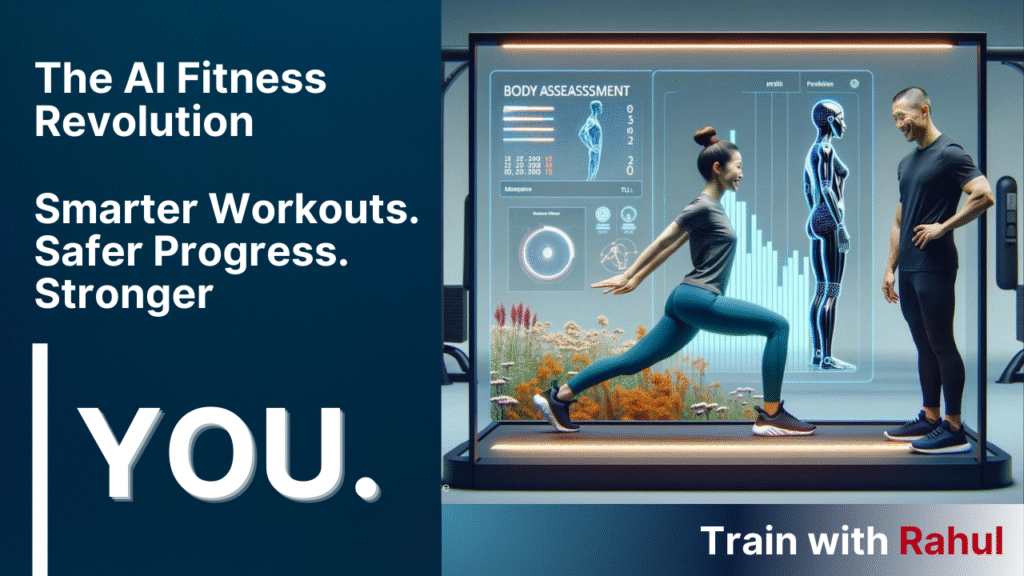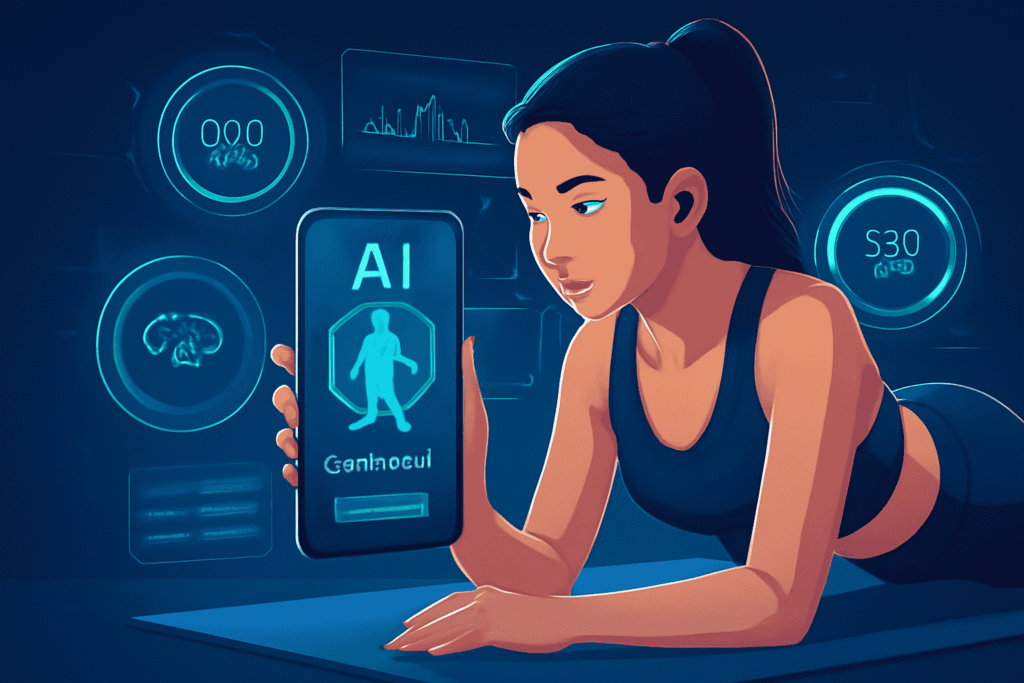The Dawn of Intelligent Fitness: Beyond Traditional Training
Imagine walking into your home gym and having an invisible coach that knows your exact energy levels, predicts your risk of injury, and adjusts your workout intensity before you even pick up a weight. This isn’t science fiction—it’s the AI fitness revolution happening right now.
Traditional fitness approaches follow rigid templates: chest on Monday, legs on Wednesday, cardio on Friday. But your body doesn’t operate on a calendar. Some days you’re energized and ready to push limits; other days, your nervous system needs recovery. Artificial Intelligence in fitness recognizes this biological reality and creates dynamic, responsive training experiences.
At the intersection of technology and human performance, we’re witnessing the emergence of smart fitness ecosystems that don’t just count reps—they understand your physiology, psychology, and long-term health trajectory.
The Science Behind AI-Powered Fitness Transformation
Modern fitness AI operates on multiple layers of sophistication that go far beyond simple calorie counting or step tracking.
Biometric Intelligence and Real-Time Adaptation
Advanced AI workout systems now integrate with wearable technology to monitor:
- Heart Rate Variability (HRV): Determining your autonomic nervous system’s readiness for intense training
- Sleep Quality Metrics: Understanding recovery patterns that influence workout capacity
- Movement Pattern Analysis: Using computer vision to assess form and prevent injury
- Metabolic Efficiency: Tracking how your body responds to different exercise intensities
This creates a personalized fitness algorithm that learns from every workout session, meal, and recovery period.
Predictive Health Analytics
Unlike static workout plans, machine learning fitness programs can predict:
- When you’re likely to plateau and need program modifications
- Your optimal training frequency based on recovery patterns
- Potential injury risks from movement compensations
- The most effective exercise combinations for your body type and goals
This predictive capability transforms fitness from reactive to proactive health management.
Revolutionary Features of Modern AI Fitness Platforms
The latest generation of intelligent workout applications incorporates breakthrough technologies that were impossible just five years ago.
Computer Vision Form Correction
Advanced AI personal training apps now use your smartphone camera to provide real-time form feedback. The system analyzes:
- Joint angles and movement planes
- Tempo and range of motion
- Symmetry between left and right sides
- Exercise execution quality scores
This technology essentially puts a biomechanics expert in your pocket, providing instant corrections that prevent injury and maximize muscle activation.
Adaptive Program Architecture
Traditional programs follow linear progression—add weight each week regardless of how you feel. Smart fitness AI creates non-linear, responsive progressions that consider:
- Your stress levels from work and life
- Hormonal fluctuations affecting strength and energy
- Previous workout performance and recovery metrics
- Long-term periodization for peak performance timing
Nutritional Synchronization
Advanced platforms don’t just plan workouts—they coordinate your entire health ecosystem. AI-driven fitness coaching includes:
- Pre-workout nutrition timing based on your metabolic profile
- Post-workout recovery meal suggestions aligned with your training goals
- Hydration strategies customized to your sweat rate and climate
- Supplement protocols based on your training phase and deficiencies
The Psychology of AI-Enhanced Motivation
One of the most overlooked aspects of fitness technology is its psychological impact. Intelligent fitness platforms are becoming sophisticated motivational tools.
Behavioral Pattern Recognition
Advanced AI systems identify your motivation patterns:
- Times of day when you’re most likely to skip workouts
- Environmental factors that influence your exercise consistency
- Social triggers that either support or sabotage your fitness goals
- Stress patterns that affect your training motivation
Personalized Reward Systems
Rather than generic badges and streaks, machine learning personal trainers create customized motivation strategies:
- Achievement systems based on your personality type
- Social challenges matched to your competitive nature
- Progress visualization methods that resonate with your learning style
- Micro-goals that align with your psychological preferences
Integration with Professional Coaching: The Hybrid Approach
The future of fitness isn’t AI replacing human trainers—it’s augmented coaching where technology amplifies human expertise.
Data-Enhanced Human Connection
Professional trainers using AI fitness analytics can:
- Spend more time on motivation and technique refinement
- Make evidence-based program adjustments using comprehensive data
- Identify subtle patterns that might indicate overtraining or life stress
- Provide more targeted advice based on objective performance metrics
Remote Coaching Revolution
Online personal training with AI support creates unprecedented opportunities:
- Real-time form feedback during virtual sessions
- Continuous monitoring between coaching calls
- Objective progress tracking that informs coaching decisions
- Scalable expertise that makes quality coaching more accessible
Specialized AI Applications for Different Fitness Goals
Modern artificial intelligence fitness solutions excel at creating specialized approaches for diverse objectives.
Strength and Hypertrophy Optimization
AI strength training programs analyze:
- Your individual muscle fiber composition through performance testing
- Optimal rep ranges and rest periods for maximum muscle growth
- Progressive overload patterns that prevent plateaus
- Exercise selection based on your biomechanical advantages
Endurance and Cardiovascular Enhancement
For aerobic fitness, smart cardio training systems provide:
- Heart rate zone optimization based on your specific physiology
- Training intensity distribution for peak endurance gains
- Recovery pacing that prevents overtraining syndrome
- Race preparation protocols tailored to your event goals
Low Impact Workout for Seniors: Specialized AI Safety Programs
AI-powered rehabilitation programs offer:
- Movement screening to identify weakness patterns
- Corrective exercise progressions based on your specific imbalances
- Load management strategies that promote tissue healing
- Return-to-activity protocols that minimize re-injury risk
Low Impact Workouts for Seniors: Age-Specific Adaptations
Advanced AI fitness programs specifically designed for older adults include:
- Joint-friendly exercise alternatives that maintain effectiveness
- Balance and stability training integrated into strength routines
- Cardiovascular improvements through gentle, sustainable methods
- Cognitive engagement exercises that support brain health while exercising
The Future Landscape of AI Fitness Technology
As we look ahead, several emerging trends will further revolutionize how we approach fitness and health optimization.
Integration with Medical Data
Future health AI platforms will incorporate:
- Genetic testing results to optimize training and nutrition
- Blood work analysis for precise supplement recommendations
- Medical history integration for safer exercise prescriptions
- Chronic condition management through adaptive fitness protocols
Environmental Intelligence
Advanced systems will consider:
- Air quality data affecting outdoor workout recommendations
- Weather patterns influencing exercise selection and intensity
- Circadian rhythm optimization based on light exposure and travel
- Seasonal adjustments for mood and energy level variations
Community AI and Social Fitness
Emerging platforms will feature:
- AI-matched training partners based on compatibility and goals
- Group workout optimization that balances individual and collective needs
- Community challenges designed by AI to maximize engagement
- Peer motivation systems that learn from successful social fitness models
Practical Implementation: Getting Started with AI Fitness
For those ready to embrace this technological fitness revolution, here’s a strategic approach to implementation.
Choosing the Right AI Fitness Platform
Key evaluation criteria include:
- Integration capabilities: How well does it work with your existing devices and apps?
- Learning sophistication: Does it actually adapt to your responses and progress?
- Professional support: Can you access human expertise when needed?
- Privacy protection: How is your sensitive health data secured and used?
Maximizing AI Fitness Results
To get the most from intelligent workout systems:
- Provide comprehensive initial data: The more information you share, the better the AI can serve you
- Maintain consistent tracking: Regular data input improves algorithm accuracy
- Trust the process: Allow time for the AI to learn your patterns and preferences
- Combine with human expertise: Use AI data to enhance conversations with healthcare and fitness professionals
Conclusion: Embracing the Intelligent Fitness Future
The AI fitness revolution represents more than technological advancement—it’s a fundamental shift toward truly personalized health optimization. By combining the pattern recognition capabilities of artificial intelligence with human expertise and motivation, we’re creating fitness experiences that are more effective, safer, and more sustainable than anything previously possible.
The key to success in this new landscape isn’t choosing between AI and human coaching—it’s intelligently integrating both to create a comprehensive approach to health and fitness that adapts to your unique life, goals, and physiology.
As these technologies continue to evolve, one thing is certain: the future of fitness is not just smart—it’s brilliantly personalized to help every individual achieve their optimal health potential.
Fill Out this Form to Get Your Free Fitness Assessment from Certified Personal Training
Frequently Asked Questions
Q: How accurate is AI-powered form correction compared to in-person training?
Modern computer vision AI can detect movement patterns with remarkable precision, often identifying subtle form issues that human eyes might miss. However, it works best as a complement to, rather than replacement for, professional coaching, especially for complex movement patterns.
Q: What data privacy concerns exist with AI fitness apps?
Leading platforms use encryption and anonymization to protect personal health data. However, users should carefully review privacy policies and choose applications that comply with healthcare data protection standards like HIPAA.
Q: Can AI fitness programs adapt to injuries or physical limitations?
Advanced AI systems can modify programs based on injury history and physical limitations, but they should always be used in conjunction with healthcare professional guidance for injury management and rehabilitation.
Q: How long does it take for AI to create truly personalized recommendations?
Most sophisticated AI fitness platforms begin providing personalized insights within 1-2 weeks of consistent use, with recommendations becoming increasingly accurate over 4-6 weeks as the system learns your patterns and responses.
Q: Are AI fitness solutions cost-effective compared to traditional personal training?
AI-enhanced fitness platforms typically cost significantly less than one-on-one personal training while providing 24/7 accessibility and consistent progression tracking. Many platforms offer hybrid models combining AI insights with periodic human coaching for optimal value.


